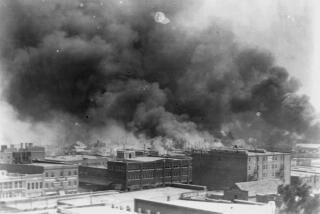Suit on WWII Slave Labor in Japan Voided
In a major defeat for the World War II reparations movement, a federal judge in San Francisco on Thursday tossed out a lawsuit seeking restitution from huge Japanese corporations that forced American prisoners to work as slave laborers.
U.S. District Judge Vaughn Walker, siding with a long-held Japanese government position, ruled that a 1951 peace agreement between the United States and Japan prohibited further claims by former soldiers of the nation’s wartime opponents.
The judge ruled on a lawsuit that had consolidated seven federal suits on behalf of 25,000 families across the nation.
Attorneys for the corporations--Mitsubishi Corp., Mitsui, Nippon Steel Corp., Nippon Sharyo Ltd., Japan Energy Corp., Ishihara Sangyo Kaisha Ltd. and others--agreed with Walker’s ruling that the treaty essentially settled any American disputes with Japan.
“It’s definitely a correct ruling. That’s what the treaty said,” said Margaret Pfeiffer, a Washington, D.C., attorney for Nippon Steel.
But David Casey Jr., one of the lawyers for the former soldiers, called Walker’s move “a major blow to these wonderful heroes.”
“Originally, there were 25,000 prisoners in the company camps; 16,000 returned from Japan, and 6,000 are still alive today,” Casey said. “While 1% of the American POWs in Germany during the war died in camps there, 37% died because of abuses in Japan’s company camps.
“So it’s outrageous that these companies, which profited from slave labor, are celebrating in their board rooms,” he said.
Mitsui and Mitsubishi, he said, “are the third and fourth largest corporations on Earth. . . . Yet they’ve never reached out to apologize or take steps.”
In his ruling, Walker said such lawsuits potentially could “unsettle half a century of diplomacy” between the two powers that signed the Treaty of Peace in 1951.
“History has vindicated the wisdom of that bargain,” the judge said. “And while full compensation for plaintiffs’ hardships, in the purely economic sense, has been denied these former prisoners and countless other survivors of the war, the immeasurable bounty of life for themselves and their posterity in a free society and in a more peaceful world services the debt.”
The former prisoners’ attorneys demanded a rehearing, which Walker granted and scheduled for Dec. 13. But rarely do judges reverse their own opinions.
The State Department also weighed in on the case, urging Walker to dismiss the suits. The U.S. government said the treaty waived all claims against Japan by the government and its nationals. Allowing the suits to proceed would undermine the peace accord, the government said.
Sheldon Harris, history professor emeritus at Cal State Northridge, described Walker’s ruling as “disgraceful. The Nazi corporations caved in, but the Japanese firms are holding tight.”
“As for the 1951 treaty, it can be read a dozen different ways,” he said. “The shameful thing is that the U.S. government continues to support the Japanese position. But then, American companies are buying significant minority shares in all of these Japanese firms. They’re all in it together.”
Harris, who has written extensively on the subject, said, “I know these POWs. They are a tragic bunch, in their 70s and 80s who suffered horribly in coal and iron mines under terrible living conditions. And when they got out, the U.S. government gave them $1 for every day they were imprisoned. That was their reward for serving their country.”
But Michael Bazyler, a professor of international law at Whittier Law School, said he was not surprised by Walker’s ruling.
“A federal judge, who is sitting alone, when told by the State Department to interpret a particular treaty involving foreign nations in a certain way, is going to take that recommendation very strongly,” he said. “But that doesn’t mean it is a correct interpretation.”
Lester Tenney, who spent three years in a slave labor camp working in a dangerous coal mine he says was owned by a large Japanese company, was dismayed by the ruling.
“I want them to say to me that we did you wrong,” Tenney said. The 80-year-old San Diego Army veteran said all he wanted was an apology, not money.
More to Read
Sign up for Essential California
The most important California stories and recommendations in your inbox every morning.
You may occasionally receive promotional content from the Los Angeles Times.











